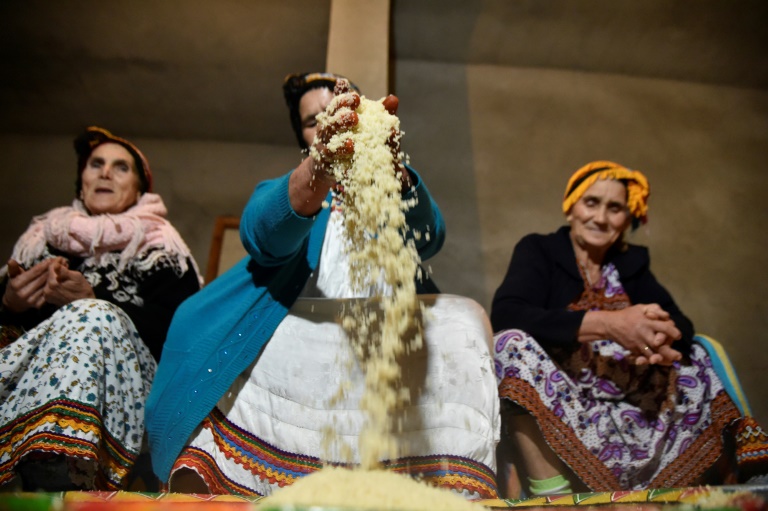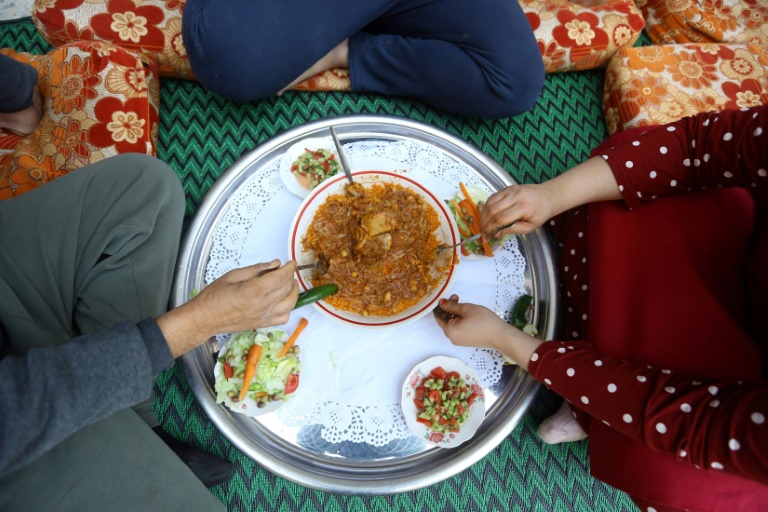Could a plate of couscous warm up relations between wary North African nations? A drive to win coveted UNESCO status for the dish could at least get them talking around the same table.
The hearty meal itself however is a bone of contention between countries that haven’t always got along.
Who makes it the best? And given that the fluffy semolina can be topped with everything from fish in Tunisia to camel meat in Libya, what truly makes a couscous a couscous?
As with the “hummus wars” that have long roiled the Middle East, and West Africa’s furious debate over who makes the best jollof rice, couscous is a source of pride as well as regional divisions.
But the countries of North Africa’s Maghreb region may be about to put their differences aside with a joint bid to have the dish added to UNESCO’s Intangible Cultural Heritage list.
The list showcases the world’s most precious cultural treasures, with the UN cultural body sometimes offering funding to countries struggling to protect their traditions.
There are as yet few details on the North African bid, but Slimane Hachi, director of Algeria’s prehistoric research centre, said that it would unite Algeria, Morocco, Tunisia, Libya, Mauritania and Mali.
– Berber cuisine? –
It will not be the first time UNESCO status has been mooted for couscous, but this time working together could prove the secret ingredient.
In 2016 Algeria announced a solo bid to win protected status for the dish — sparking outrage in Morocco where many feel they hold an equal claim to it.
Even the question of who introduced the basic ingredients to the region is hotly debated, with some crediting the Romans and others saying Arabs brought it in from the east.

Berber women prepare couscous in Algeria, one of many countries in North Africa where the dish is a source of pride
French food historian Patrick Rambourg said the Berbers, an ethnic group spread across the region, were likely the first to rustle up a couscous — “long before the countries of the Maghreb that we know today existed”, he told AFP.
Another food historian, Lucie Bolens, has described primitive couscous pots found in Algeria dating back to the reign of king Massinissa 2,200 years ago.
Considered a Berber forefather, Massinissa united what is now northern Algeria with parts of Tunisia and Libya into the ancient kingdom of Numidia.
Rambourg argues the region should celebrate its shared heritage rather than fretting over who really lays the best claim to couscous.
“Its origins are a complicated subject, a slippery slope — and is it really that important?” he said.
“For all the countries in the Maghreb, couscous is a part of their identity.”
The countries involved will have to come to a common position if they are to mount a successful UNESCO bid, he warned.
“They’d have to show the historic permanency of the dish or its preparation, showing it’s a part of daily life for all the groups constituting a people or a nation and that it’s part of their identity.”
And they should probably downplay the huge diversity between couscouses served up across the region, he advised.
– Regional rivalries –
Kader Abderrahim, a French researcher at the Institute for European Perspective and Security, said neighbouring rivals Algeria and Morocco might struggle to work together.
“There are such entrenched positions on both sides that it’s very complicated to find areas of agreement, including on a subject that might seem harmless,” he said.
“There is so much antagonism that has been built up for 50 years and that has got a lot worse, especially in recent months.”

A family prepares to eat freshly cooked couscous in Libya, where the dish is sometimes topped with camel meat
Algiers and Rabat have eyed each other jealously since the 1960s, when Algeria’s new post-independence authorities refused to shift the borders set out under French colonial rule, leaving some areas disputed.
Abderrahim said it was a paradox that the Maghreb “has not succeeded in integrating as a region”, despite “a common culture, a shared history, the same language and religious tradition”.
The Maghreb should be “stronger than Europe which is divided by language and history”, he said.
Fatema Hal, an anthropologist and Paris restauranteur who was born in Morocco, says UNESCO recognition would be a positive step for the region.
“If couscous can help bring them together, all the better,” she said.
“But rather than putting all our energy into trying to get a label, we should be doing what’s necessary to preserve our cuisine.”
Promoting the region’s cuisine at its own cookery schools — which tend to focus instead on international cuisine — she added would be a good start.
Support Local Journalism
Add The Citizen as a Preferred Source on Google and follow us on Google News to see more of our trusted reporting in Google News and Top Stories.








